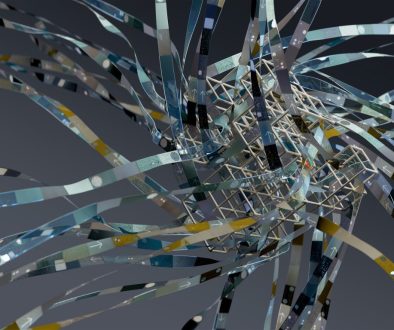Proof, Episode 1: Junk
Behind the mud-splattered windows at the back of Wrangel Repair & Thrift, Tucky Calloway hunched over a busted radio. As usual, his workbench, an eight by five sheet of half-inch plywood slapped across two dinged-up, yellow sawhorses, was crammed with repair jobs — enough to keep him chained to it for weeks. That was a good thing. Now that Carla had walked out, the only place he’d rather be was flat on his back, asleep.

Lean and lanky, Tucky stood six-foot-two and, despite a lifetime of moodiness, managed to shamble around the back room with an unaffected grace that many a dancer might envy. His fire engine red hair, that had lately straggled down to shoulder-length, gave him the air of a Medieval wizard. It was an effect compounded by a pair of deep-set blue eyes that stared out at the world with a quizzical mix of insecurity and self-confidence.
Most days, Tucky worked until his long, calloused fingers ached. He had a knack for fixing anything with wires hanging out of it, and a generalized obsession with tinkering. A “Shop” course in high school and six months at Cole Community College had helped him pick up the basics. The rest he’d learned by riffling through the hundreds of back issues of Nuts & Volts and Popular Mechanics left behind by a disgruntled former employee. A dusty pile of magazines from the 1990s teetered on the brink of collapse, mere inches away from his left foot.
Just have to … listen to it, he told himself about the clock-radio in pieces on his workbench.
That’s how he usually spent the early morning hours, waiting for a device to tell him what it needed to revive. But this morning was different. Gerd Wrangel was out inspecting an estate sale seventy-five miles away in Cynthiana, and Tucky had the disagreeable task of dealing with his customers. At the moment, one of them was jamming on the shopfront counter bell like a Heavy Metal drummer.
Tucky switched off his soldering iron, wiped his sweaty hands on his jeans and scuffed his Timberlands out of his dark warren into the shop’s bright main room. A short, stocky man in his early sixties glared at him from behind the shop’s glass display case, in which a tempting array of refurbished toasters and CD players beckoned to savvy bargain hunters. With the morning sun bouncing off his shiny, bald head, the man looked like the personification of Hopping Mad. The blue Bic pen, parked behind his right ear, suggested a life-long intolerance for inefficiency. As Tucky walked in, the older man hefted a large supermarket box, bearing the blue, Kroger logo, up onto the shop’s main countertop.
“Took you long enough,” he said. “You got a girl back there?”
Tucky’s mouth curled up into a crooked smile.
“In your dreams, maybe,” he said.
He peered into the box, then reached for the printed intake pad that Gerd always used when a new “shipment” arrived. Though Tucky was itching to get back to work, the contents of the box had already aroused his curiosity — a rare event in his life. And no wonder. The carton originally intended for canned peas, was filled to the brim with a wide assortment of truly odd electronic components.
Tucky started asking the standard questions that Gerd had outlined on the sheet, but the more the bald man spoke, the more Tucky wanted to know. Turns out, the cantankerous older man was a widower who’d finally decided to clean out his deceased wife’s closets.
“Don’t ask me what they’re for,” said the widower. “Olga had all kinds of junk stowed away that I never knew about.”
Tucky ignored him, already preoccupied with the contents of the box, none of which he could identify. In fact, once he got his hands on a couple of pieces, it was hard to set them down again. But the shiny bald head on the other side of the counter drummed an insistent rhythm into the slightly cracked glass counter.
“Can you give me something for them or not?” he asked.
“Gerd,” said Tucky without looking up, “… he’ll have to call you after he’s looked these over. You have a phone?”
Drew muttered under his breath, but grabbed the Bic pen and scratched out an address and phone number on the back of one of Gerd’s dusty business cards. Tucky watched absently as the older man repositioned the pen and shuffled his stooped frame out to the sidewalk that ran along Highland Avenue. A second later, Tucky returned to the back room, with his eyes glued to the flat, bronze rectangle that rested at the bottom of the box. He set the box down on his bench, reached in and pulled the odd-looking thing out with trembling hands.
In the angled September sunlight that streamed in through the shop’s cracked windows, he could see it was a weird kind of tablet. At first, it looked as if a hobbyist had tried to build a cheap knock-off of an iPad. But a closer look revealed several quirky details. For starters, he’d never seen a tablet dotted with triangular buttons. Plus, the more he stared at it, the more the milky-white glow of it screen seemed to seep into his mind. It was almost as if he could feel the screen warming the inside of his skull.
He drew his breath through his front teeth and grabbed for the business card that his grouchy customer had left for him. “Drew Flaherty,” read the scrawled name. The address was only a 20-minute drive away.
Tucky glanced at the row of thirteen, perfectly synchronized clocks, hung with care along the south wall of the shop and gathered it was already 4:00 PM. Just how long, he wondered, had he been fiddling with the tablet?
Gotta get these parts for myself, he decided.
With Gerd out of town and business slow, he figured he might as well drive over now and pay the widower right away. Assuming, that is, he could get his pockmarked, Honda Civic started. At twelve years old, the slate blue used car, whose maintenance Tucky could barely afford, was one more thin thread connecting him to his sanity. Without a car … no, he didn’t even want to think about how awful his life would be.
As he drove out toward Worthville, Tucky felt his shoulders relax and his mind clear, the farther he got from the shop and the … the box. But clarity had its drawbacks, for his thoughts now flooded with Carla’s face, Carla’s voice, Carla’s sundress draped over the foot of his bed.
Good thing the old man had come along, he decided. He needed some way to take his mind off his abject misery. Though most people would agree that, at age twenty-four, one bad break-up didn’t mean that Tucky’s life was over, he wasn’t convinced. That very morning, his mind had revolved around a nauseating recurrent dream — the one where he jumped into the Ohio River and was chewed up by tiny sharks. But ever since … since the box … it felt like the dream was fading from memory. He had a mission now, didn’t he? He had to focus.
So as he pulled up to a small house along Route 467, Tucky squeezed his eyes tight and, at least for now, pushed Carla out of his mind. He opened his eyes again and studied the white, slate-roofed home with the mud-brown fencing around a narrow porch. Its oversized dormer window peeked out at him like a warning beacon or a sentinel. Or so it seemed, until he realized that this was just one of a cluster of buildings that faced the railroad tracks. It was, in other words, as reassuringly normal as it could possibly be. Why, he wondered, did it make the pit of his stomach tie up in knots? He climbed out of his Civic and crunched up the gravel driveway to the front porch, his legs trembling all the way. But with the sun already starting its lazy slouch towards the horizon, there was nothing for it but to rap on the screen door frame.
No answer. Normally, that would have been enough to discourage Tucky. But a new impetus, a force he’d never felt before, emboldened him to push his way through the front door into a small entryway. To his left, an interior door opened up to a compact kitchen. There sat Drew Flaherty, sound asleep at the kitchen table, a glass of red wine still clutched in one hand. Relief washed over Tucky as he tiptoed backwards and prepared to turn around. No use waking the old guy.
That is, until the broad heel of his Timberlands came down hard on the paws of Flaherty’s yellow Tom cat. The screeching and hollering that followed took quite a few minutes to settle down — until Tucky could convince the old man that he’d only come to pay for the components.
“Only fifteen bucks?” asked Drew.
“Twenty,” said Tucky. The way he figured it, he’d be buying one less movie ticket a week from now on. Later, based on his conversation with the widower, he realized he could probably have gotten away with less. Yet as the younger man pulled the Civic away from curbside, what stuck in his mind wasn’t the money.
“Haven’t been able to sleep since I dragged that damn box out of the closet.” Drew had told him. “Kept hearing a voice, a little like Olga’s … except it was talking some kind of gibberish.”
(To be continued, in Episode 2)
^^^
Mark Laporta is the author of Probability Shadow and Entropy Refraction, the first two novels in the science fiction series, Against the Glare of Darkness, which are available at a bookstore near you, on Amazon and at Barnes & Noble. He is also the author of Orbitals: Journeys to Future Worlds, a collection of short science fiction, which is available as an ebook.
TITLE IMAGE BY JULIUSH/PIXABAY; INTERIOR DESIGN BY STEVEN S. DRACHMAN FROM AN IMAGE BY UMBERTO SHAW/PEXELS



